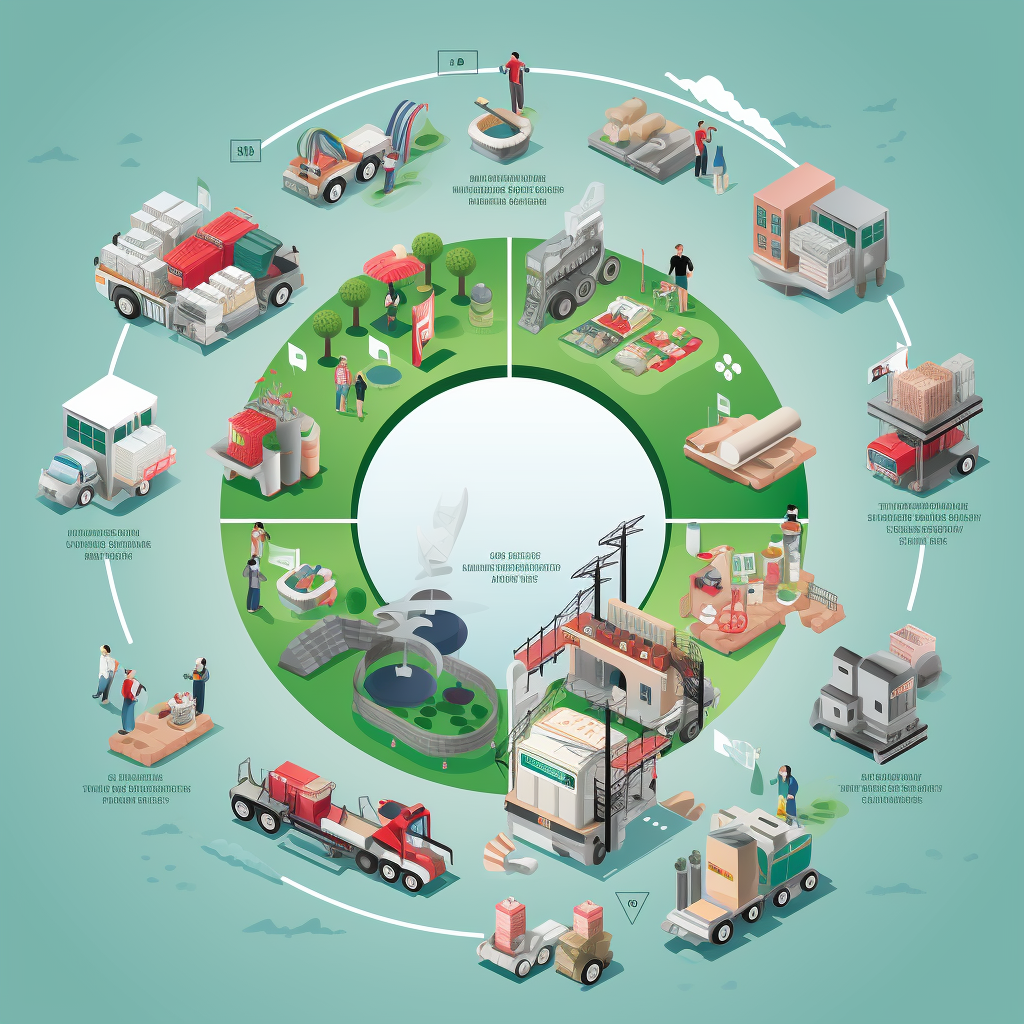Traceability in recycled plastics is becoming increasingly important as the plastics industry moves towards a more sustainable and circular economy. The ability to trace the origin and journey of recycled plastics helps to ensure transparency, quality, and compliance in the production and use of recycled plastics.
As the world grapples with the growing environmental impact of plastic waste, the importance of recycling and sustainable materials management has become increasingly apparent. Recycling plastics reduces the amount of waste in landfills and the environment. It also conserves natural resources and supports the transition to a sustainable economy. The effectiveness of recycling efforts depends on quality and traceability.

Types of Traceability in Recycled Plastics:
There are two main types of traceability in recycled plastics: physical and digital. Material traceability involves marking the product or packaging with a unique identifier that can be tracked throughout the supply chain. Digital traceability involves using software systems and databases to track the origin and journey of recycled plastics.
Traceability in recycled plastics is crucial for the plastics industry as it ensures that recycled materials meet the required standards and regulations. It is used to trace the origin of the plastic waste, the type of plastic, the recycling process, and the final product. Traceability is used in various industries, including packaging, construction, automotive, and electronics.

Application Areas:
Traceability in recycled plastics is used in various application areas, including food and beverage packaging, consumer goods, building and construction materials, and automotive parts. For example, recycled plastics can be used to create food packaging, such as plastic bottles, that are safe for consumption.
Consumer Product Examples:
Many consumer products contain recycled plastics that are traceable physically and digitally. Such products include reusable shopping bags, water bottles, and electronic devices.
Material Properties:
Recycled plastics have a different set of material properties than virgin plastics. The quality and properties of recycled plastics depend on the type of plastic, the recycling process, and the degree of contamination. Some recycled plastics may have reduced mechanical properties, lower melting points, or higher impurities.
Future Trends in Recycling:
The use of recycled plastics is expected to increase as the industry moves towards a more sustainable and circular economy. This will lead to the development of new and innovative recycling technologies and processes that improve the quality and properties of recycled plastics. The use of blockchain technology is also expected to become more prevalent, providing a secure and transparent way to trace the journey of recycled plastics.
Global Impact:
Traceability in recycled plastics has a significant impact on the global environment. By ensuring that recycled plastics meet the required standards and regulations, traceability helps reduce plastic waste’s environmental impact. Using recycled plastics also helps conserve natural resources, reduce greenhouse gas emissions, and prevent plastic pollution in the oceans.
Future Market Prognosis:
The future of the recycled plastics market looks promising, with the demand for recycled plastics expected to increase due to the growing awareness of sustainability and the circular economy. Developing new and innovative recycling technologies and processes is expected to improve the quality and properties of recycled plastics, making them more competitive with virgin plastics. The use of blockchain technology is also expected to become more prevalent, providing a secure and transparent way to trace the journey of recycled plastics.
Types of Traceability in Recycled Plastics:
There are two main types of traceability in recycled plastics: physical and digital. Physical traceability involves marking the product or packaging with a unique identifier that can be tracked throughout the supply chain. Digital traceability involves using software systems and databases to track the origin and journey of recycled plastics.
Application Areas:
Traceability in recycled plastics is used in various application areas, including food and beverage packaging, consumer goods, building and construction materials, and automotive parts. For example, recycled plastics can be used to create food packaging, such as plastic bottles, that are safe for consumption.

Global Impact:
Traceability in recycled plastics significantly impacts the global environment and economy. It helps reduce plastic waste’s environmental impact. The recycling industry creates jobs and contributes to the local economy, and using recycled plastics can reduce costs for manufacturers.
Different countries have different policies and regulations for recycling and the use of recycled plastics. In the European Union, the Circular Economy Package includes targets for recycling and the use of recycled materials. In the United States, the EPA provides guidelines and resources for recycling and waste reduction. In developing countries, there is often a lack of infrastructure for recycling, leading to increased plastic pollution and environmental damage.
Advantages of Traceability
Traceability in recycled plastics is a process that involves tracking the journey of recycled materials from their initial source to their final destination. This can apply several steps, including collecting and sorting plastic waste, processing and manufacturing recycled plastics, and using and disposing products made from recycled plastics.
The advantages of Traceability in recycled plastics include:
- Improved transparency and accountability: Traceability allows stakeholders in the recycling industry to know where recycled materials come from and how they are being used, which can increase accountability and transparency.
- Better quality control: Traceability can help to ensure that recycled plastics are of high quality and meet the required standards, which is essential for manufacturers who use recycled plastics in their products.
- Increased efficiency: By tracking the journey of recycled plastics, it is possible to identify areas where improvements can be made to increase efficiency and reduce waste.
Disadvantages of Traceability in recycled plastics include:
- Complexity: Tracing recycled plastics can be complex and time-consuming, requiring significant resources and expertise.
- Cost: The cost of implementing traceability measures can be high, a barrier to adoption for some businesses and organisations.
- Limited effectiveness: There may need to be more than Traceability to address all the challenges facing the plastics industry and recycling. Other factors such as education, infrastructure, and policy are also important for successful recycling.
Why Traceability is important:
Traceability in recycled plastics is essential for ensuring transparency, quality, and compliance in the production and use of recycled plastics. Using physical and digital traceability methods helps to ensure that recycled plastics meet the required standards and regulations. The future of recycling looks promising, with new technologies and processes being developed to improve the quality and properties of recycled plastics. The plastics industry must continue to innovate and collaborate to ensure a sustainable and circular economy for the future.
As the world grapples with the environmental impact of plastic waste, it’s become increasingly clear that recycling and sustainable materials management are critical to protecting our planet and its resources. By embracing traceability measures in recycled plastics, we can create a more transparent, efficient, and sustainable recycling industry that benefits everyone. From improving product quality to reducing waste and conserving natural resources, the advantages of traceability in recycled plastics are numerous and essential to building a more sustainable future.








